White Castle
aka Llantilio Castle
Ger Y Fenni, Monmouthshire, Wales
|

Featured Location Guide
 |
Imposing moated remains of 12th century
castle originally known as Llantilio Castle, with a deep moat, 6 towers and
a curtain wall, with only one section of curtain wall missing. The castle was
originally like many in Wales covered in render and painted white. Some remains
exist today of this rendering.
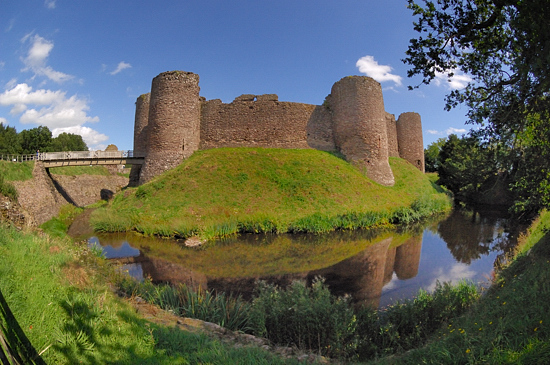 
| The earthworks of White Castle forms three
separate enclosures. In the centre is the pear-shaped inner ward, surrounded by
a wet moat with stone sealed sides, and containing the walls and towers of the
main defences of the castle. To the south is a crescentic hornwork. On the north
- the side from which visitors approach the castle - is an outer ward with its
own stone curtain wall, towers, and a gatehouse surmounting the basic
earthworks. Initially, this third area was part of a much larger outer enclosure
which surrounded the entire eastern half of the castle. Some traces of its
defensive bank can be seen on the ground, but it is much clearer when seen in an
aerial photograph. From this you can see that this was in its time a
sizable castle. Both this castle and Usk castle had originally the same design, when
they had an earth and timber structure. At this point the entry was from the
south. When the current stone castle was developed in the 13th century it
was turned so as to have a northern entry. One of what was known as the "Three Castles"
they formed a strategic triangle controlling this area of the southern March.
The other two were
Grosmont
 and
Skenfrith, and
Skenfrith,
 all three were Royal castles in the later 12th century, and in 1201 were granted
to Hubert de Burgh by King John. Unlike the other two, White Castle was not
rebuilt by de Burgh in the new defensive style of the early 13th century.
all three were Royal castles in the later 12th century, and in 1201 were granted
to Hubert de Burgh by King John. Unlike the other two, White Castle was not
rebuilt by de Burgh in the new defensive style of the early 13th century.
 |
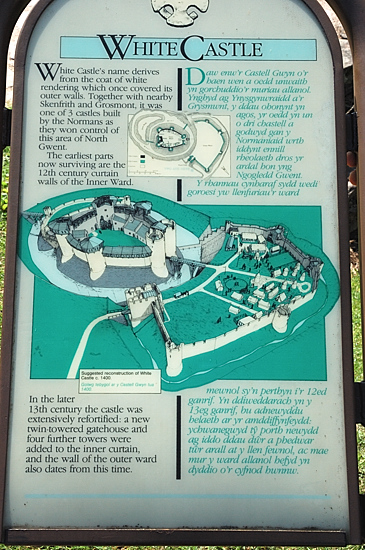 |
The high curtain wall you can climb today, by
climbing the gatehouse tower, dates from 1184-86, from where you can see
the outer bailey, moat, inner ward and the surrounding countryside. It allows
you to see how the castle fits into the countryside and gives an idea of the
overall defensive plan of the castle.
Later with threats passed, White Castle, like
Grosmont
 and
Skenfrith, and
Skenfrith,
 was largely abandoned but all three castles remained for
a time as local centres of administration, estate management, and revenue
collecting. The records show that monies were spent for the repair and upkeep of
the castle through the end of the Middle Ages, and this contributed to the
castle's state of preservation, where others have fallen down. was largely abandoned but all three castles remained for
a time as local centres of administration, estate management, and revenue
collecting. The records show that monies were spent for the repair and upkeep of
the castle through the end of the Middle Ages, and this contributed to the
castle's state of preservation, where others have fallen down.
Today you can see the deep moat with water
steep sides, and impressive structure and explore other remains.
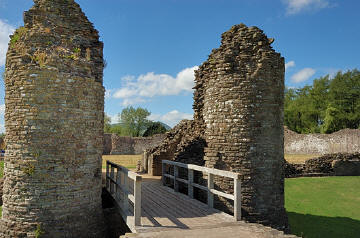 |
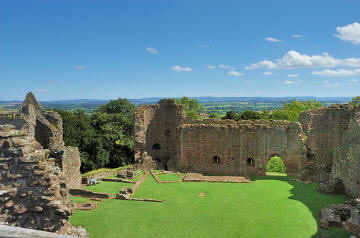 |
 The Original Gatehouse - very little left
The Original Gatehouse - very little left |
 A view of the inside taken from curtain wall
A view of the inside taken from curtain wall |
You will find few photographs of this castle
including the full central curtain wall and moat with water, because the moat is
deep, and when most go back far enough to get the castle into their photograph
they are too far back to see the water. I managed to take a photograph that does
include the castle and water with my toes on the edge of the moat using a
modified fisheye, 10,5mm on a Nikon DX format camera. without this you
could use a helicopter or pole to get the camera higher or perhaps its an
application where you could stitch together a number of photographs, like a
panorama but in the vertical as well as the horizontal directions to get
the field of view required.
Behind the structure, accessible from inside
the through a hole in the wall, there is an area of the moat that
is part unfilled and where you can now clamber across providing other
photographic opportunities.
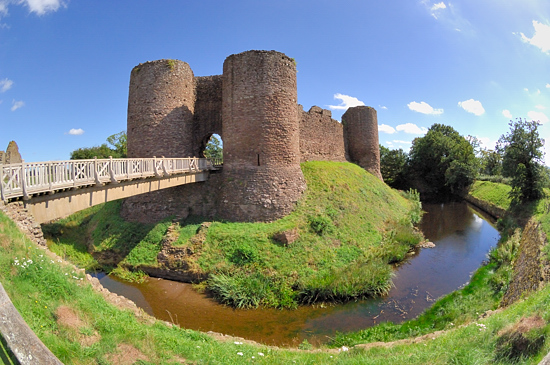 
The history of
the developments in Wales that brought about the need for this and the other
castles is covered in the article
Wales - a potted history

 a gallery is available for this castle, which links back to this page.
a gallery is available for this castle, which links back to this page.
.
Planning Grid
|
Location: |
White Castle,
Monmouthshire, Wales |
|
Grid Reference: |
SO380168 |
|
Getting there: |
One mile from the village of Llantilio Crossenny |
|
Access: |
Down very narrow country lanes, and uphill.
From car park from pay desk enter through gate and walk across to castle
entrance. |
|
Parking: |
limited Parking on site, if it gets busy
parking in the lanes will be difficult for others to pass. |
|
Facilities: |
None |
|
Things To Do,
See and Photograph: |
Castle remains, including some further out,
mote, country views. |
|
What to take: |
wide angle lenses if you have them |
|
Nature highlights: |
You may see some wildlife on the moat, that is
varied in width, and plantlife in surrounding grass. |
|
Address: |
White Castle
Ger Y Fenni
Monmouthshire |
|
Postcode: |
NP7 8UD |
|
Telephone: |
01600 780380 |
|
Opening times: |
01.10.08-31.03.09: Open site 10am-4pm
Daily
01.04.09-31.10.09: Daily 10.00-17.00
01.11.09-31.03.10: Open site 10am-4pmdaily Closed:-
24th, 25th, 26th December, 1st
January
Last admission 30 minutes before closing other
than on open site days.
|
|
Charges: |
CADW and English Heritage members (1YR plus)
free, English Heritage members fist year 50%.
Entry is FREE for Welsh residents aged 60 and
over or 16 and under who have a
valid pass.

Open sites are unstaffed and open to the
public with no admission charge, at all reasonable times, usually between 10am
and 4pm daily. See opening hours for when this applies to this location
Adult £2.60, concession £2.25, family £7.45 |
|
Photo Restrictions: |
None known |
|
Other Restrictions: |
None known |
|
Special Needs Access: |
Difficult for wheelchair users |
|
Special Needs Facilities: |
None |
|
Children Facilities: |
None specific |
|
Dogs Allowed: |
From April
2009, dogs on leads will be also welcome at Cadw monuments.
please see
information for dog owners
 |
|

|
Please let us know any other information that we
can add to the Further information and Planning Grids or page and any errors that you discover. Before making a long trip to any location it is always
wise to double check the current information, websites like magazines may be
correct at the time the information is written, but things change and it is of
course impossible to double check all entries on a regular basis. If you have
any good photographs that you feel would improve the illustration of this page
then please let us have copies. In referring to this page it is helpful if you
quote both the Page Ref and Classification from the Grids above. To print the
planning grid select it then right click and print the selected area.
Please submit information on locations you discover so
that this system continues to grow.
|